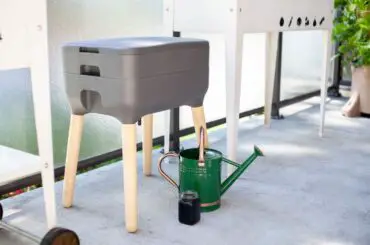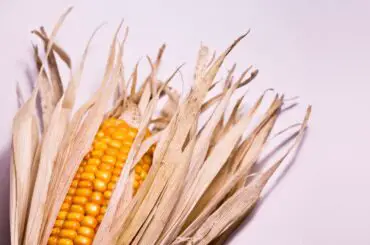Can I Use Earthworms For Composting? Yes. Earthworms are often used in vermicomposting, which is a type of composting that uses worms to speed up the decomposition process. However, not all earthworms are well-suited for vermicomposting.
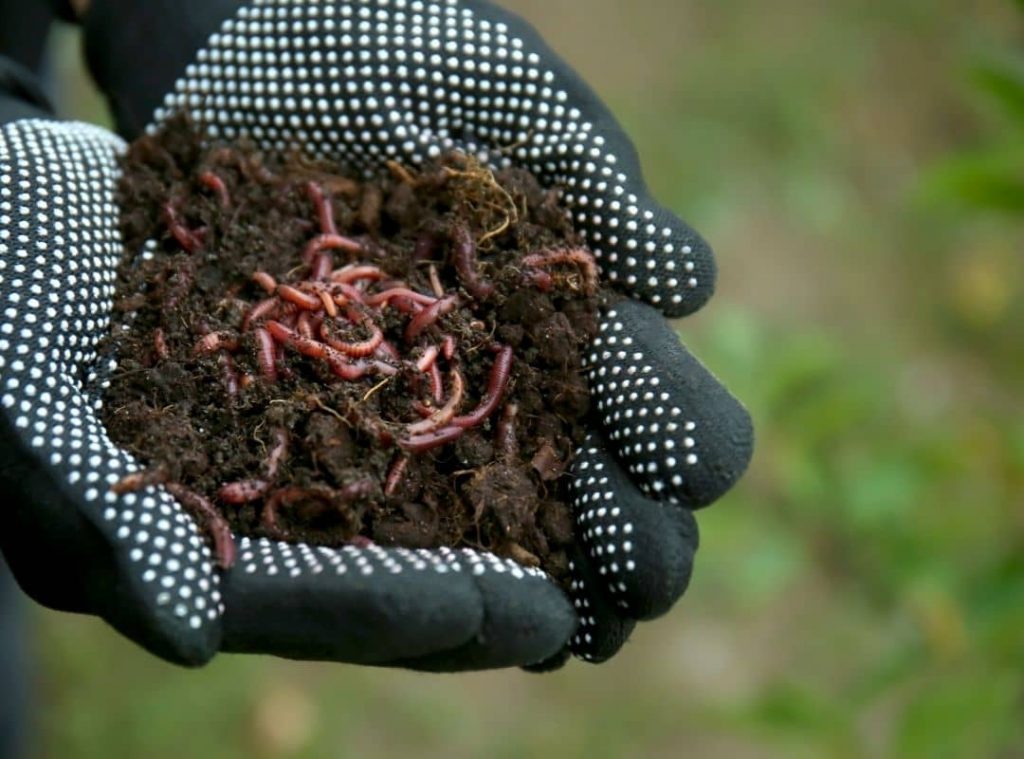
Many gardeners prefer compost over other soil amendments because it is relatively easy to make and an excellent way to recycle yard and kitchen waste. While there are many different recipes for compost, most of them contain some combination of vegetable scraps, coffee grounds, eggshells, and leaves. One common ingredient that is often overlooked is earthworms. Let’s look closely at whether you can compost with earthworms and how to do so if you do.
What Is Composting?
Contents
- 1 What Is Composting?
- 2 What Is Vermicomposting?
- 3 How Long Does It Take For Worms To Compost?
- 4 Can I Use Earthworms For Composting?
- 5 What Type Of Worm Is Best For A Composting Bin?
- 6 Are Earthworms The Same As Red Wigglers?
- 7 Compost Worms Vs. Earthworms
- 8 Can Red Wigglers And Earthworms Live Together?
- 9 How Many Worms Do You Need To Start Composting?
- 10 Can You Have Too Many Worms In Your Compost?
- 11 The Benefits of VermiComposting
- 12 Does Worm Composting Smell?
- 13 Can You Put Bread In Worm Compost?
- 14 Do red wigglers go dormant in winter?
- 15 Conclusion
Composting is the procedure of breaking down organic matter, such as leaves and vegetable scraps, into a form that can be used as a soil amendment. This process is usually done through the action of bacteria and other microorganisms, which break down the organic matter into smaller pieces that plants then absorb.
What Is Vermicomposting?
Vermicomposting is a type of composting that uses worms to speed up the decomposition process. Worms consume organic stuff and excrete it in the form of castings, which are a type of nutrient-rich compost.
How Long Does It Take For Worms To Compost?
The amount of time it takes for worms to compost depends on the type of worm, the temperature, the moisture content, and the size of the organic matter. Generally, it takes about 24 hours for two pounds of worms to compost a pound of organic matter.
Can I Use Earthworms For Composting?
Yes. You can use earthworms for composting. However, not all types of earthworms are well-suited for vermicomposting. You’ll need to use a certain species of composting worms that aren’t as harmed by high temperatures in the compost and prefer eating decaying organic materials. We use the term “earthworm” for any member of the annelid family Lumbricidae. This family contains over 4,000 species of earthworms. The vast majority of these earthworms do not make good composters because they are not well adapted to eating decaying organic matter.
The earthworms best suited for composting are members of the Eisenia genus. These earthworms are also known as “red wigglers,” “composting worms,” or “manure worms.” Eisenia earthworms are small, red, and have a lifespan of about one year. They are well-adapted to eating decaying organic matter and prefer temperatures between 55 and 77 degrees Fahrenheit.
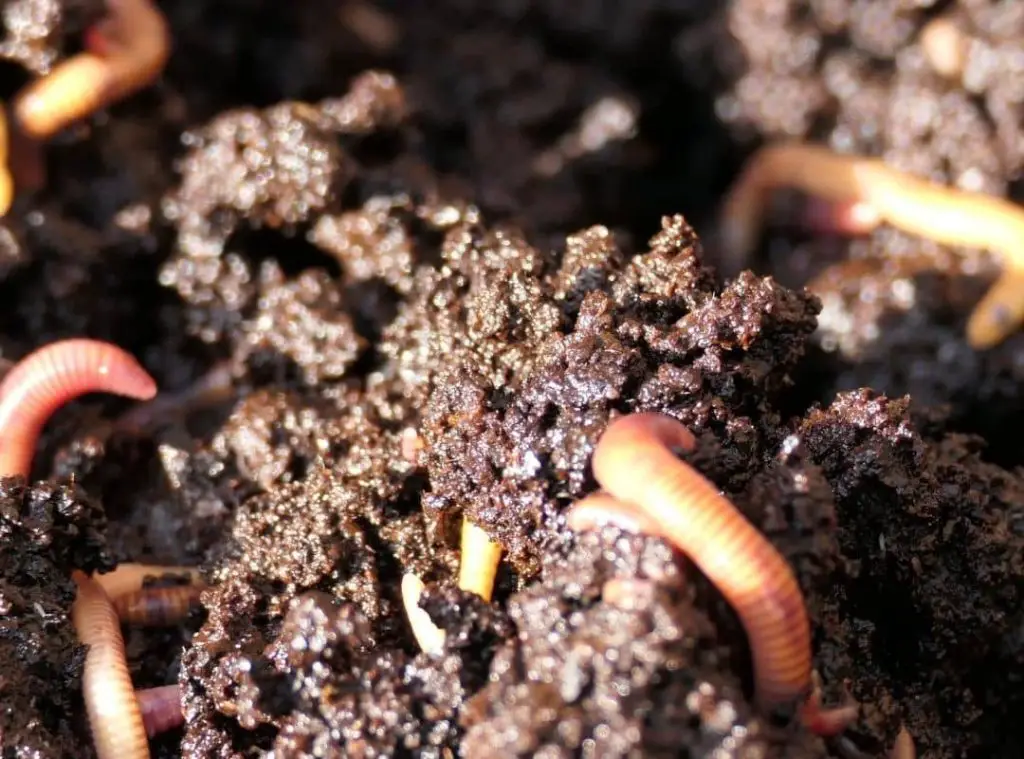
What Type Of Worm Is Best For A Composting Bin?
Eisenia earthworms are the best type of worm to use for composting because they are not as harmed by high temperatures in the compost and prefer eating decaying organic materials. If you decide to use earthworms for composting, you’ll have to go with Eisenia earthworms.
Are Earthworms The Same As Red Wigglers?
No. Earthworms are not the same as red wigglers. Red wigglers are a type of earthworm that is well-suited for composting. While we refer to all worms that live on earth as earthworms, we usually refer to night crawlers as common earthworms. That being the case, not all earthworms are red wigglers, but all red wigglers are earthworms.
Compost Worms Vs. Earthworms
Earthworms and compost worms are both members of the annelid family, but they have some key differences. Earthworms are typically larger than compost worms and prefer to consume soil rather than organic matter. They also tend to burrow deeper into the ground and are generally solitary creatures.
In contrast, compost worms prefer to live near the surface and eat rotting organic matter. They also typically live in groups rather than alone. These different preferences are due to the different conditions that each type of worm prefers.
Earthworms thrive in cool, moist environments with plenty of soil to burrow through. Compost worms, on the other hand, prefer warm, wet conditions with plenty of organic matter to eat. As a result, earthworms and compost worms rarely interact with one another in the wild.
So, if we summarize the key differences between earthworms and compost worms in a table:
| Type of Worm | Key Differences |
| Earthworm | Larger than compost worms (Up to 12 inches)Prefers to consume soilBurrows deeper into the groundGenerally solitary creatures |
| Compost Worm | Prefers to consume organic matterSmaller than earthworms (Up to 2.5 inches)Lives near the surfaceLives in groupsPrefers warm, wet conditions |
Good to Know: Both types of worms help decompose organic materials in the soil. But, compost worms are more efficient since they prefer to consume organic matter. Earthworms also eat organic matter. But due to their living conditions preferences, they don’t consume as much organic matter as compost worms do.
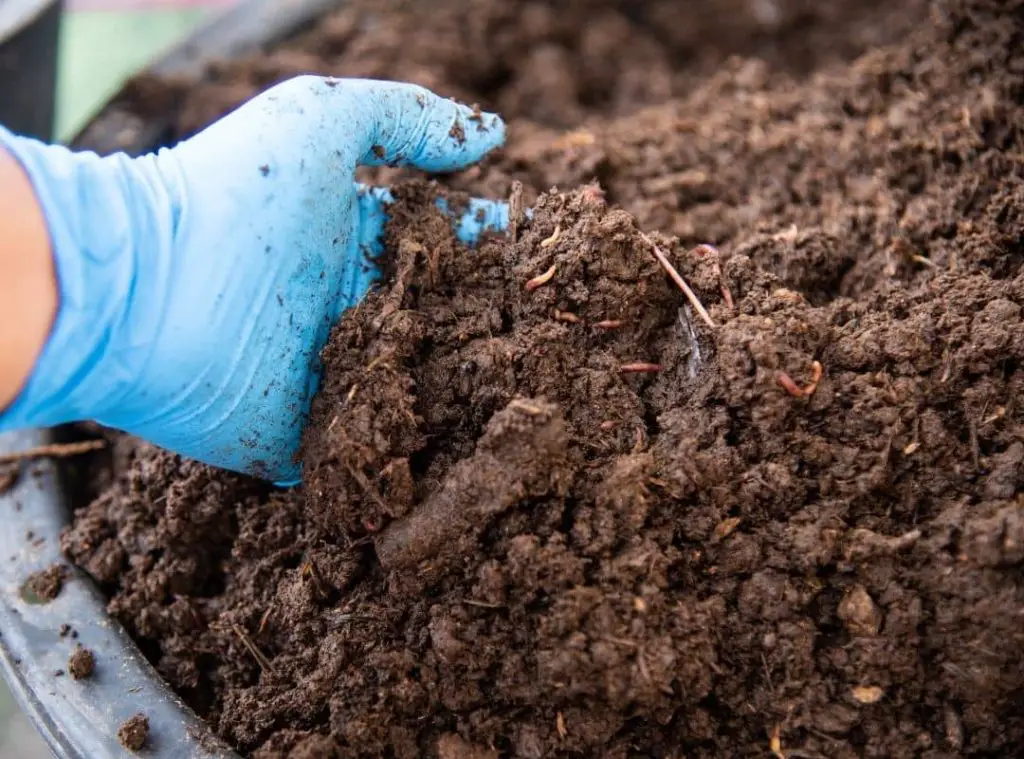
Can Red Wigglers And Earthworms Live Together?
Red wigglers and earthworms can live together, but it’s not ideal. Earthworms prefer cooler temperatures and moister conditions than red wigglers. As a result, earthworms and red wigglers generally don’t live together in the wild. In warm soil conditions, earthworms have fewer chances to survive. Even if they survive, they won’t breed as often as in their optimal conditions. In fact, earthworms have been known to leave an area if the conditions become too hot and dry.
As compost bins are usually hot (about 55-77 degrees Fahrenheit), earthworms don’t survive well in them. While it is possible for red wigglers and earthworms to live together, they generally don’t because they prefer different conditions. If you want to use earthworms for composting, you should go with red wigglers instead.
How Many Worms Do You Need To Start Composting?
There is no fixed number of worms required to begin composting. A good rule is one pound of worms for every three pounds of food scraps. If you start with too many worms, they will have difficulty finding enough food, and some may start to die off. However, if you have too many food scraps and not enough worms, the food will start to rot instead of composting. The best way to find the right balance is to start with a small number of worms and add more as needed. You can always add more food scraps if the worms are having trouble keeping up.
Can You Have Too Many Worms In Your Compost?
It is possible to have too many worms in your compost bin. But, if the worms are allowed to enter and exit the bin freely, they will balance out their population based on the amount of food available. However, if you are adding composting worms to your bin, their population can increase rapidly. Over time, the compost will break down, and the worm population will level out (either from worms leaving the bin or dying from lack of food).
As long as the worms have enough food, they will be fine. Further, red wigglers can adjust their population by leaving the bin when the conditions are not ideal. So, you don’t have to worry about having too many worms in your compost.
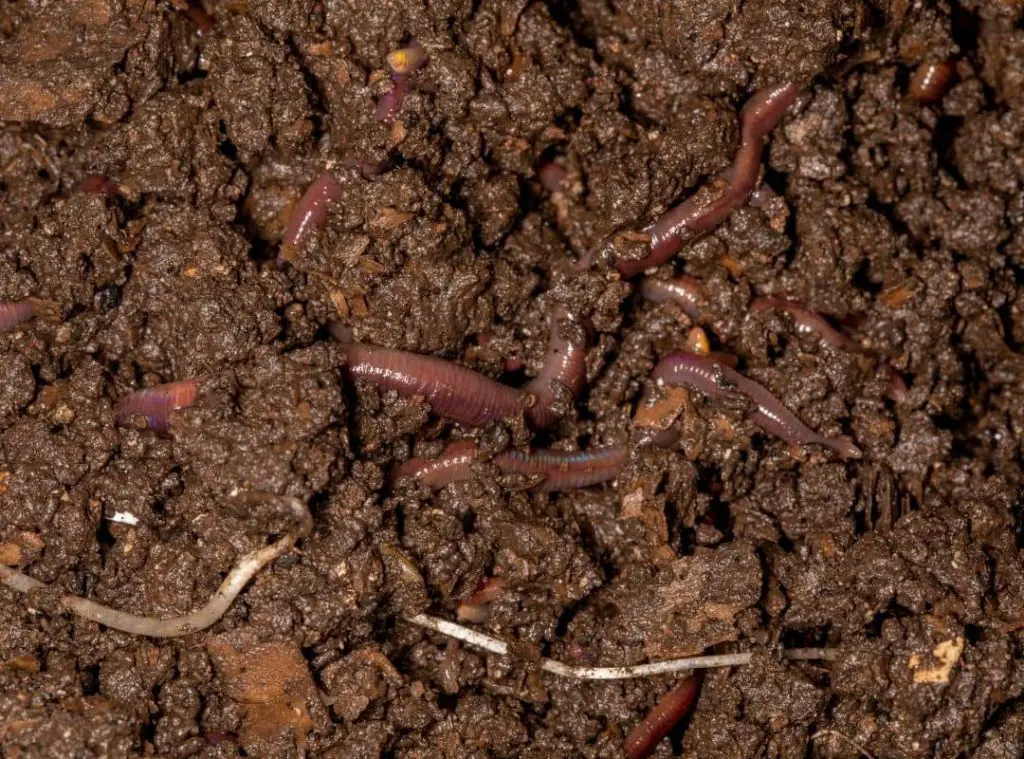
The Benefits of VermiComposting
Vermicomposting, or composting with worms, has several benefits.
Reduces your household waste
Vermicomposting is a great way to reduce your household waste. Food scraps and other organic materials account for a significant amount of waste disposed of in landfills. By composting your food scraps with worms, you can reduce the waste you send to the landfill.
It’s easy and low-maintenance.
Vermicomposting is an easy and low-maintenance way to compost. Once you have your bin set up, all you need to do is add food scraps and bedding material as needed. The rest will be done by the worms.
No bad smells
When done correctly, vermicomposting should not produce any bad smells. The worms will consume the food scraps and bedding material, leaving behind a rich compost that has little to no odor.
Great for your plants
Worm compost is great for your plants. It is full of nutrients and minerals that plants need to grow. Worm compost can also help improve the structure of your soil.
It’s fun!
Vermicomposting is a great way to get kids interested in composting. They will love watching the worms eat their food scraps and turn them into rich compost. And they will be proud to know that they are helping the environment.
FAQ
Does Worm Composting Smell?
A properly balanced composting bin shouldn’t smell much different than rich garden soil. You might think that worm castings (aka “black gold”) might emit a foul odor like other animal dung, but it simply isn’t the case. If your bin smells bad, it could be due to a number of factors, including too much green material, not enough air circulation, or too much moisture. Adding some dry brown material, such as shredded newspaper or dried leaves, and aerating the compost will usually solve the problem. If the smell persists, adding more worms to the bin might be necessary.
Can You Put Bread In Worm Compost?
Bread can be added to a worm compost bin, but it is best to avoid adding too much. Bread is a good source of nutrients for worms, but it can also attract pests, such as mice and rats. If you add bread to your bin, chop it into small pieces so the worms can easily consume it.
Do red wigglers go dormant in winter?
Red wigglers are able to withstand a wide range of temperatures, but they will go dormant if the temperature falls below 55F. If your bin is outdoors and the temperature starts to drop, you can move the bin indoors to a garage or basement. If you reside in a cold area, you may need to invest in a heating mat to keep your bin warm.
Conclusion
Can I Use Earthworms For Composting? You can use earthworms for composting, but you should ensure those are red wigglers as they are the best type for composting. Further, your bin should be adequate for the number of worms you have, and you should ensure there is proper aeration, drainage, moisture, and temperature. If done correctly, your vermicomposting bin shouldn’t produce bad smells and provide fresh compost for your plants.
Read Next : Does Urine Speed Up Composting? (Affirmative)

